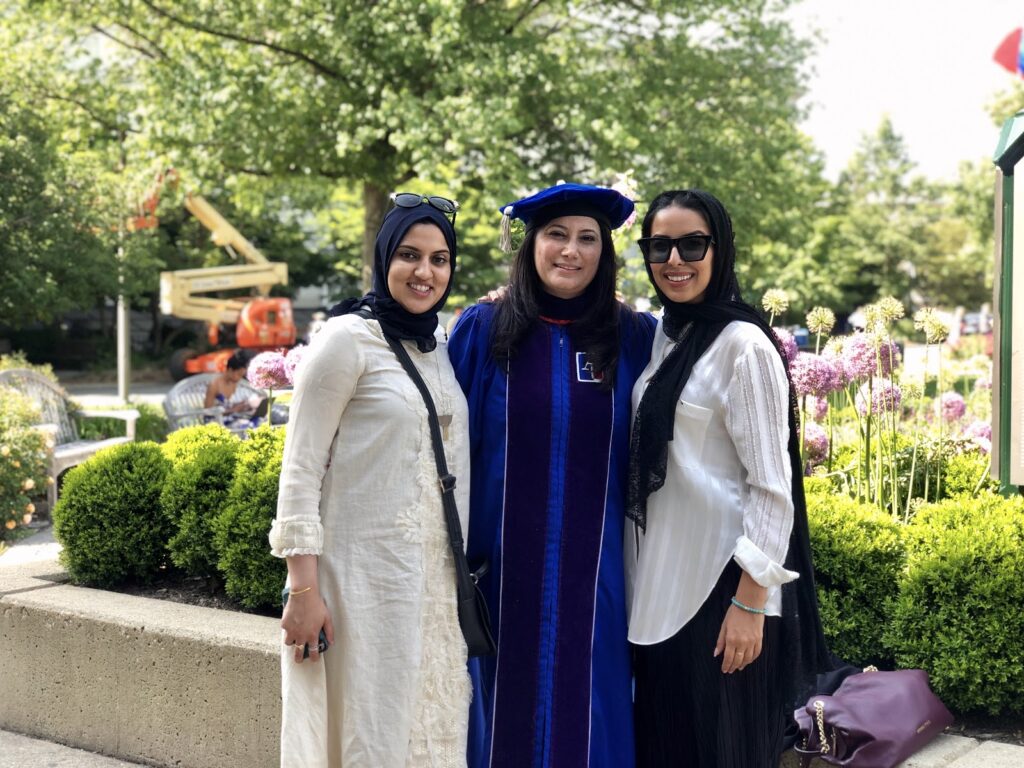Ikram Foundation invests in education for Muslimas across the U.S.

By Saman Quraeshi
September/October 2022
The conversation around being a divorced or widowed Muslima in the U.S. is changing.
Since 2014, the catalyst of this change has been Ikram Foundation, a Herndon, Va. 501(c)3 nonprofit organization. Through its Employment Career and Prep Project, to date it has distributed $600,000 in grants for education to 150+ clients nationwide.
Ikram Foundation executive director Somayyah Ghariani explains, “Ikram does one service, and that is empowering women by investing in their education. The women we work with are strong, resilient and inspiring individuals who, despite the challenges they are facing, still push through and give back to their children and communities.”
According to data from the 2006-10 National Survey of Family Growth, approximately half of all first marriages in the U.S. will end in divorce. Ghariani mentioned that statistically, divorced or widowed Muslimas may be at a greater risk of poverty and have more barriers to overcome, among them language, health problems, gendered Islamophobia, special needs children, lack of confidence, trauma background and no work experience or education from their homelands.
“We are in the business of breaking cyclical poverty,” says Ghariani. She gave an example by sharing about a client who went from serving tables to working in the IT sector. She is now a proud Ikram program alumni and mentors other women in the IT space.
“We saw our client going from waiting tables and making $2.00 an hour to being in a managerial position making six figures as a software QA tester. The passion for the work we do at Ikram Foundation is renewed every single time we have a new application come through, and we get to really step into the lives of each one of our clients. Being in a position where you can see empowerment play out through the journey of education not only renews our passion, but makes it even stronger.”
Saman Quraeshi, an Ikram alumni and program director, agreed and added, “The reason why I am literally standing today as the program director of Ikram, as well as a therapist, is because I had a community around me that invested in my growth.” She recalled the experience of coming to the foundation first as a client.
“As a newly divorced single mother, I was overwhelmed with pain and had very little confidence. I remember meeting with the former executive director and telling her sheepishly about what I wanted to do, and she didn’t hesitate and believed in me even when I didn’t believe in myself.”
Quraeshi remarks that her own educational journey has given her insight and the drive to help clients continue the path of education. “I was able to see how my situation changed, how my mental health improved and how I became excited about my future. That and many other experiences gave me the blueprint to continue working with a population whom I deeply care for and relate to.”
Delhi Elkambo, an Ikram Grant recipient, says, “I am truly grateful for the generosity of the Ikram Foundation toward funding my post-bachelor studies. My lifelong goal has been to become a doctor, and I truly believe Ikram Foundation’s contributions places me one step closer to realizing that goal, al-hamdu llilah. This organization was quick in its response and generous in its donations. I felt truly dignified during my interactions with Ikram. I am forever grateful, and I pray that this organization grows to benefit even more of our sisters. Jazak Allahu khair.”
This year, Ikram Foundation has seen a significant increase in applications from women across the country seeking educational grants. For the first half of 2022, it has distributed over $84,000 in grants to 32 beneficiaries across nine states. Beneficiaries received degrees and certifications in a wide array of fields, including software testing, echocardiography technician, data analytics and certified medical assistant, among others. According to an Institute of Islamic Policy and Understanding (ISPU) 2020 American Muslim Poll, “A majority of Muslims would like more support for divorced people in their faith community.”
An increase in support from the Muslim community has allowed Ikram to continue to grow and reach more women in need. This past Ramadan, the foundation was honored to be the winning charity of the Muslim Women’s Giving Circle’s Ramadan giving campaign. Also, Ikram has received grants from the Washington Area Women’s Foundation, Human Concern International (HCI), Muslim Aid USA (MAUSA) and other grant-giving entities. These partnerships have expanded the organization’s reach from stakeholders to beneficiaries.
Ikram’s most recent partnerships, those established with Lutheran Social Services, helps distribute grants for education to newly arrived divorced or widowed Afghan women. Many of these women arrived as refugees with educational backgrounds in such fields as medicine and law. One shared client was a physician and, after arriving in the U.S. as a widow, came to Ikram seeking assistance in evaluating her degree so she could practice her profession to support herself and family.
In its capacity as a client-centered organization, our work at the foundation has revealed to us that we are stronger together. It takes the larger community to uplift divorced or widowed Muslimas and their children. Muslims can each play a part in changing the conversation and narrative around being divorced or widowed as a Muslima.
Ikram, which welcomes potential beneficiaries, can be reached at www.ikramfoundation.org.
Tell us what you thought by joining our Facebook community. You can also send comments and story pitches to [email protected]. Islamic Horizons does not publish unsolicited material.
